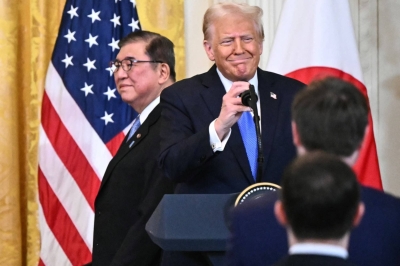China maintains a de facto fixed exchange rate for the yuan. Japan has continued to intervene aggressively to prevent a sharp rise in the yen. In a veiled criticism of both countries' currency policies, a communique issued last weekend by Group of Seven finance ministers and central bankers called for "more flexible" exchange rates based on market principles.
Not surprisingly, the yen has now come under strong buying pressure here and abroad. No doubt traders and investors believe the G7 statement has made it hard for Japan to continue intervention in the same way as before. In the Tokyo foreign exchange market on Monday, the yen climbed temporarily to 111 yen to the dollar, the highest in two years and nine months.
The yen's surge, coming at a time when Japan's economy looks set for a rebound, has introduced a new uncertainty into the stock market here. The Nikkei stock average went into a tailspin on Monday, losing 463 points — the biggest single-day fall so far this year. It closed below 10,500 for the first time since late August.

















With your current subscription plan you can comment on stories. However, before writing your first comment, please create a display name in the Profile section of your subscriber account page.